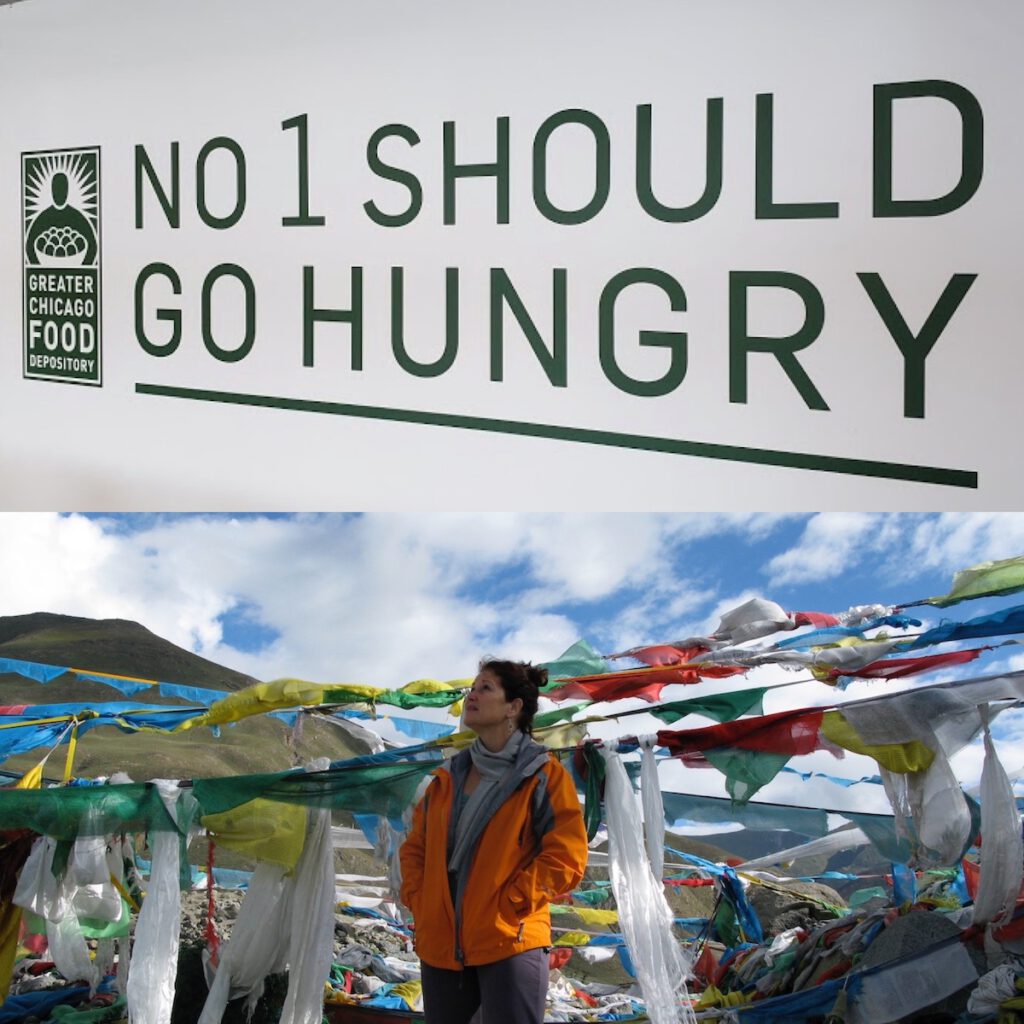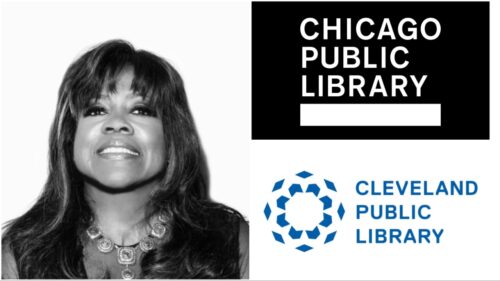Ever since I encouraged you to e-mail us at editor@ebertdigital.com and tell us about a movie, TV show, book, play, song, recipe, remembrance, person, dream or life experience that takes you to your Happy Place, I have received so many wonderful submissions that I have decided to turn this column into a regular series. It began with my initial personal post about how I’ve found my own Happy Place, continued with a post featuring the first submissions we received.
Today, however, I am featuring people whose happy place is found in helping others, in ways both domestic and international. Arlene Samen astonishingly left her regular life behind to follow the advice of the Dalai Lama and ended up saving the lives of mothers and babies abroad for over two decades. Rashada Dawan is an actor who read about gun violence in Chicago while she was on tour in another country and decided that if she wanted to help stem the violence from guns and gangs around her, she had to take a stand: a stand for peace. See the video of her in action in our Video of the Day. Film journalist Jana Monji is helping others by making masks, putting to use skills she inherited from her immigrant parents.
And on a personal level, I was touched by some of the writers at this site who refused payment for their work but instead asked me to donate their money to charity in remembrance of Chadwick Boseman and other causes. We decided to do the most basic of service, feeding others. And so the Chicago Greater Food Depository will receive our check, and we hope, yours. Today is my birthday, and I can’t think of a happier column to publish. So please, keep those submissions coming. Write to me at editor@ebertdigital.com to tell us about your happy place. —Chaz Ebert

1.
Arlene Samen, One Heart Worldwide
When I think of my happy place, I think of my precious 10 years living and working in Tibet. In 1998, I had the blessing to meet His Holiness the Dalai Lama. When I was 12 years of age, I told my mom I was a Buddhist. Never in my wildest imagination did I think I could meet a living Buddha. I met the Dalai Lama at his home in India. I had traveled there with a medical team to help children born with cleft lips and facial deformities. While in Dharmsala, our team of doctors were asked if we wanted to have an “audience” with HHDL (His Holiness Dalai Lama)! Of course we all said yes. What do you say to a living Buddha? Humbly I bowed and asked “what can I do for you”?

My background in maternal fetal medicine was exactly what was needed. In Tibet, 1 out of 100 women died in childbirth, as did 1 out of 10 babies. I had my calling, “Go help the women and children in Tibet,” HHDL said to me. “On the path of service all doors will open!” I left my academic career behind and spent the next 23 years of my life living and working in Tibet and Nepal. My heart fills with joy when I think of my time on the roof of the world. The magic of the Himalaya’s will live on forever in my heart!

2.
Rashada Dawan, actor and founder of Karaoke for Peace
My #happyplace used to be telling stories on stage. As an actress and singer I had the privilege of traveling all over the world performing in “The Lion King” and other plays and musicals, but while on tour I kept hearing so much sad news about gun violence in Chicago and particularly in my neighborhood on the Southside of Chicago. I came home and kept hearing the same and knew I wanted to be part of the solution. I didn’t have a lot of money but I could donate my time and talent. I took cardboard boxes and paper and pasted them on foam board to make signs. I copied sheets with lyrics to songs, and I went to the areas where there had been the most gun violence and set up my Karaoke for Peace stand. I wanted to reach out through song and compassion to inspire peace. Part of my performance was done in collaboration with a memorial for a policeman who was killed. And what I found is that lots of people wanted the same thing, to come together for peace. Some sang with me, some wanted hugs, some shed tears. But in the coming together we found a shared humanity, and for at least those brief moments, peace.

To be honest, the coronavirus pandemic and quarantine sent me into the process of grieving. We were in the middle of a production of “Intimate Apparel” which was to be featured at the Northlight Theater in April, and we had to stop abruptly after the dress rehearsal. I cried after I left the stage with my theater family. However, amidst acknowledging my aching heart, I am grateful to say that I have also found another happy place: in my home and in my community! As a proud South Shore resident, time has been given to me to help bring healing to my neighbors and to my home as a mother to my two daughters. I love being present to help my teenager stumble through her teens and to watch my 3-year-old discover the lyrics to “Let It Go” from Disney’s Frozen and “How Far I’ll Go” from Disney’s “Moana“. So, I’m learning that happy places can be in more than one place and for that, I am grateful.

3.
Our contributors’ contribution to the Greater Chicago Food Depository
For my birthday this year, I am making a donation to the Greater Chicago Food Depository, a gift that had been made possible by the generosity of some of our contributors at RogerEbert.com. When I say contributors I mean not only our regular film critics and writers, but freelancers from other sites such as Quinn Hough from Vague Visages, Muslim Chaplain Omer M. Mozaffar, and our Assistant Editor Nell Minow, to name a few. It also includes those who have gone through the Ebert Fellowship programs, the Far Flung Correspondents from other countries, the women who contribute to Women Writers Week and so many more. I am sure they will be embarrassed for me to mention their generous acts, but they touched my heart with their generosity. And they allowed me to choose a charity. Some donated the money in honor of the late Chadwick Boseman and his charitable acts. Others did it just because.
Even though this is primarily a movie review site, I continue my late husband Roger’s legacy in writing about life itself. And at this point in my life, the FECK principles are what I aspire to: Forgiveness, Empathy, Compassion and Kindness. I am so very fortunate to be surrounded by so many people who also embrace these principles. And as I say, it all boils down to love. Because we couldn’t donate great sums I asked myself what is one of the most loving acts we can do for each other, and the answer (perhaps because I am from a big family) was to feed another. So I chose the amazing food depository.
The Greater Chicago Food Depository consists of a network of more than 700 food pantries, soup kitchens, shelters and other programs that provide food where it is most needed in Cook County. Public benefits outreach and job training programs are also in place to support the community.
I hope you will also consider making a donation here or by sending a check payable to Greater Chicago Food Depository to the following address: Greater Chicago Food Depository, 4100 W. Ann Lurie Pl, Chicago, IL, 60632. You can also find out how to get involved here. For more information on the Greater Chicago Food Depository or to make a donation, see here.

4.
Jana Monji, Our Far-Flung Correspondent
Happiness can be created by giving to others through random acts of kindness. My happy place is found making a face mask for a friend on a sewing machine that is older than I am. This sewing machine has significance because it was bought for my mother by my father (before he knew of his terminal diagnosis of Multiple Sclerosis), and given to me by my mother. My father and mother were both artists and you create art for others to see and appreciate but also to please oneself.
Creating beauty and creating community seems like a form of prayer, an act of faith and hope. There’s something about the act of careful and even obsessive designs and craftsmanship. My studies in different crafts have allowed me to see the quality and even the love in each careful connection in metal, glass and even fabric. When my father was still alive, we had a curious backyard garden that once included rows of corn. The garden was also a means of sharing from fruits and vegetables to seeds and bulbs. Baking also was a means of giving. I suppose these are old-fashioned values and ways of community building.
My happy place is found in creating community through the donation of masks to help keep others safe and healthy. For years, I’ve collected fabric and kept old clothes, including my husband’s old Aloha shirts, thinking some day I would use them. I came into this marriage with three sewing machines: My mother’s, my grandmother’s and a beautiful black hand-cranked machine with ornate gold from the 1890s that I bought in England. An Antique Roadshow evaluator told me it was worth nothing. Now I take the time to meticulously craft these pieces into masks of various designs.
Video of the Day
Rashada Dawan’s Karaoke for Peace program was covered two years ago by CBS Chicago‘s Audrina Bigos.












